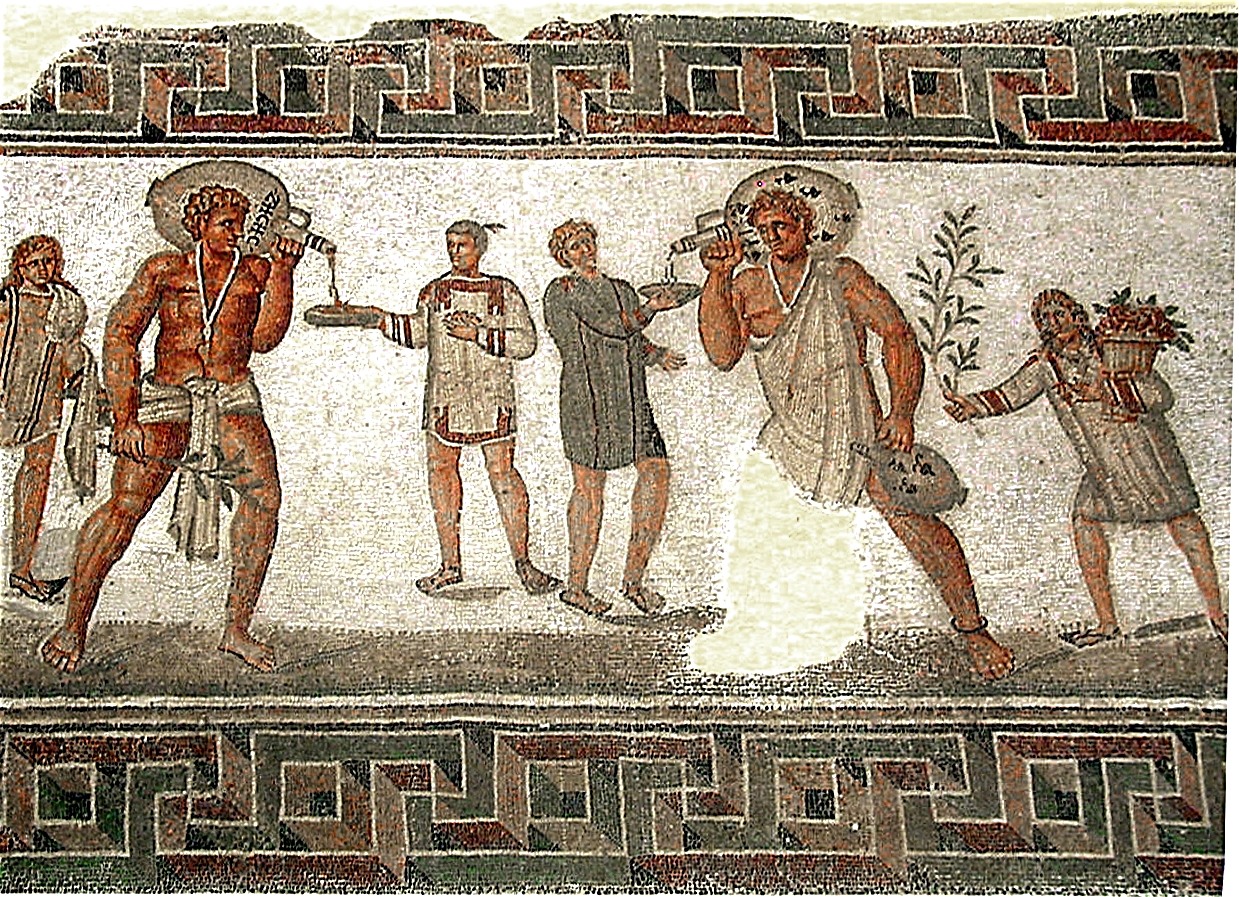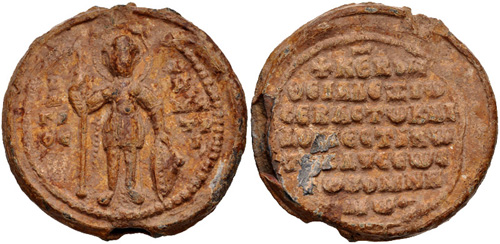|
Slavery In The Byzantine Empire
Slavery was common in the early Roman Empire and Classical Greece. It was legal in the Byzantine Empire but it was transformed significantly from the 4th century onward as slavery came to play a diminished role in the economy. Laws gradually diminished the power of slaveholders and improved the rights of slaves by restricting a master’s right to abuse, prostitute, expose, and murder slaves. Slavery became rare after the first half of 7th century. From 11th century, semi-feudal relations largely replaced slavery. Under the influence of Christianity, views of slavery shifted: by the 10th century slaves were viewed as potential citizens (the slave as a ''subject''), rather than property or chattel (the slave as an ''object''). Slavery was also seen as "an evil contrary to nature, created by man's selfishness", although it remained legal. Sources of slaves A main source of slaves were prisoners of war, of which there was a great profit to be made. The ''Synopsis of Histories'' menti ... [...More Info...] [...Related Items...] OR: [Wikipedia] [Google] [Baidu] |
Slavery In Ancient Rome
Slavery in ancient Rome played an important role in society and the economy. Besides manual labour, slaves performed many domestic services and might be employed at highly skilled jobs and professions. Accountants and physicians were often slaves. Slaves of Greek origin in particular might be highly educated. Unskilled slaves, or those sentenced to slavery as punishment, worked on farms, in mines, and at mills. Slaves were considered property under Roman law and had no legal personhood. Most slaves would never be freed. Unlike Roman citizens, they could be subjected to corporal punishment, sexual exploitation (prostitutes were often slaves), torture and summary execution. Over time, however, slaves gained increased legal protection, including the right to file complaints against their masters. One major source of slaves had been Roman military expansion during the Republic. The use of former enemy soldiers as slaves led perhaps inevitably to a series of ''en masse'' armed rebel ... [...More Info...] [...Related Items...] OR: [Wikipedia] [Google] [Baidu] |
Slavs
Slavs are the largest European ethnolinguistic group. They speak the various Slavic languages, belonging to the larger Balto-Slavic branch of the Indo-European languages. Slavs are geographically distributed throughout northern Eurasia, mainly inhabiting Central and Eastern Europe, and the Balkans to the west; and Siberia to the east. A large Slavic minority is also scattered across the Baltic states and Central Asia, while a substantial Slavic diaspora is found throughout the Americas, as a result of immigration. Present-day Slavs are classified into East Slavs (chiefly Belarusians, Russians, Rusyns, and Ukrainians), West Slavs (chiefly Czechs, Kashubians, Poles, Slovaks and Sorbs) and South Slavs (chiefly Bosniaks, Bulgarians, Croats, Macedonians, Montenegrins, Serbs and Slovenes). The vast majority of Slavs are traditionally Christians. However, modern Slavic nations and ethnic groups are considerably diverse both genetically and culturally, and relations between them � ... [...More Info...] [...Related Items...] OR: [Wikipedia] [Google] [Baidu] |
Code Of Justinian
The Code of Justinian ( la, Codex Justinianus, or ) is one part of the ''Corpus Juris Civilis'', the codification of Roman law ordered early in the 6th century AD by Justinian I, who was Eastern Roman emperor in Constantinople. Two other units, the Digest and the Institutes, were created during his reign. The fourth part, the ''Novellae Constitutiones'' (New Constitutions, or Novels), was compiled unofficially after his death but is now also thought of as part of the ''Corpus Juris Civilis''. Creation Shortly after Justinian became emperor in 527, he decided the empire's legal system needed repair. There existed three codices of imperial laws and other individual laws, many of which conflicted or were out of date. The Codex Gregorianus and the Codex Hermogenianus were unofficial compilations. (The term "Codex" refers to the physical aspect of the works, being in book form, rather than on papyrus rolls. The transition to the codex occurred around AD 300.)Jolowicz, 1972, p. 463 ... [...More Info...] [...Related Items...] OR: [Wikipedia] [Google] [Baidu] |
Justinian I
Justinian I (; la, Iustinianus, ; grc-gre, Ἰουστινιανός ; 48214 November 565), also known as Justinian the Great, was the Byzantine emperor from 527 to 565. His reign is marked by the ambitious but only partly realized ''renovatio imperii'', or "restoration of the Empire". This ambition was expressed by the partial recovery of the territories of the defunct Western Roman Empire. His general, Belisarius, swiftly conquered the Vandal Kingdom in North Africa. Subsequently, Belisarius, Narses, and other generals conquered the Ostrogothic kingdom, restoring Dalmatia, Sicily, Italy, and Rome to the empire after more than half a century of rule by the Ostrogoths. The praetorian prefect Liberius reclaimed the south of the Iberian peninsula, establishing the province of Spania. These campaigns re-established Roman control over the western Mediterranean, increasing the Empire's annual revenue by over a million ''solidi''. During his reign, Justinian also subdued the ''Tz ... [...More Info...] [...Related Items...] OR: [Wikipedia] [Google] [Baidu] |
Diocletian
Diocletian (; la, Gaius Aurelius Valerius Diocletianus, grc, Διοκλητιανός, Diokletianós; c. 242/245 – 311/312), nicknamed ''Iovius'', was Roman emperor from 284 until his abdication in 305. He was born Gaius Valerius Diocles to a family of low status in the Roman province of Dalmatia. Diocles rose through the ranks of the military early in his career, eventually becoming a cavalry commander for the army of Emperor Carus. After the deaths of Carus and his son Numerian on a campaign in Persia, Diocles was proclaimed emperor by the troops, taking the name Diocletianus. The title was also claimed by Carus's surviving son, Carinus, but Diocletian defeated him in the Battle of the Margus. Diocletian's reign stabilized the empire and ended the Crisis of the Third Century. He appointed fellow officer Maximian as ''Augustus'', co-emperor, in 286. Diocletian reigned in the Eastern Empire, and Maximian reigned in the Western Empire. Diocletian delegated further on ... [...More Info...] [...Related Items...] OR: [Wikipedia] [Google] [Baidu] |
Nomismata
''Nomisma'' ( el, νόμισμα) was the ancient Greek word for "money" and is derived from nomos (νόμος) anything assigned, a usage, custom, law, ordinance".The King James Version New Testament Greek Lexicon; Strong's Number:3546 The term ''nomos'' may also refer to an approximately 8 gram Achaean coin denomination. Other uses In Modern Greek, the word ''nomisma'' means "currency".Greek-English Lexicon It is also a term used by numismatists when referring to the ''pieces of money or coin'' in the ''plural'' ''nomismata'' an example of which is the Aes rude of Numa Pompilius (the 2nd King of Rome).Pliny the Elder 77 A.C.E., book 34 See also *Aristotle *Numismatics *Roman Republican coinage References Citations {{reflist, 30em Bibliography *''Ancient Greek-NOMISMA:'' "money", The King James Version (KJV) New Testament Greek Lexicon; Strong's Number:354*Aristotle, NICOMACHEAN ETHICS 133b 1 translations: a) Thomas Taylo b) Sir (William) David Ross KB c) Harris Rackha* ... [...More Info...] [...Related Items...] OR: [Wikipedia] [Google] [Baidu] |
Eunuch
A eunuch ( ) is a male who has been castrated. Throughout history, castration often served a specific social function. The earliest records for intentional castration to produce eunuchs are from the Sumerian city of Lagash in the 2nd millennium BCE. Over the millennia since, they have performed a wide variety of functions in many different cultures: courtiers or equivalent domestics, for espionage or clandestine operations, castrato singers, concubines, or sexual partners, religious specialists, soldiers, royal guards, government officials, and guardians of women or harem servants. Eunuchs would usually be servants or slaves who had been castrated to make them less threatening servants of a royal court where physical access to the ruler could wield great influence. Seemingly lowly domestic functions—such as making the ruler's bed, bathing him, cutting his hair, carrying him in his litter, or even relaying messages—could, in theory, give a eunuch "the ruler's ear" and impa ... [...More Info...] [...Related Items...] OR: [Wikipedia] [Google] [Baidu] |
Castration
Castration is any action, surgical, chemical, or otherwise, by which an individual loses use of the testicles: the male gonad. Surgical castration is bilateral orchiectomy (excision of both testicles), while chemical castration uses pharmaceutical drugs to deactivate the testes. Castration causes sterilization (preventing the castrated person or animal from reproducing); it also greatly reduces the production of hormones, such as testosterone and estrogen. Surgical castration in animals is often called neutering. The term ''castration'' is sometimes also used to refer to the removal of the ovaries in the female, otherwise known as an oophorectomy, or the removal of internal testes, otherwise known as gonadectomy. The equivalent of castration for female animals is spaying. Estrogen levels drop following oophorectomy, and long-term effects of the reduction of sex hormones are significant throughout the body. Castration of animals is intended to favor a desired development of ... [...More Info...] [...Related Items...] OR: [Wikipedia] [Google] [Baidu] |
Alexios I Komnenos
Alexios I Komnenos ( grc-gre, Ἀλέξιος Κομνηνός, 1057 – 15 August 1118; Latinized Alexius I Comnenus) was Byzantine emperor from 1081 to 1118. Although he was not the first emperor of the Komnenian dynasty, it was during his reign that the Komnenos family came to full power and initiated a hereditary succession to the throne. Inheriting a collapsing empire and faced with constant warfare during his reign against both the Seljuq Turks in Asia Minor and the Normans in the western Balkans, Alexios was able to curb the Byzantine decline and begin the military, financial, and territorial recovery known as the Komnenian restoration. His appeals to Western Europe for help against the Turks was the catalyst that sparked the First Crusade. Biography Alexios was the son of John Komnenos and Anna Dalassene,Kazhdan 1991, p. 63 and the nephew of Isaac I Komnenos (emperor 1057–1059). Alexios' father declined the throne on the abdication of Isaac, who was thu ... [...More Info...] [...Related Items...] OR: [Wikipedia] [Google] [Baidu] |
Vikings
Vikings ; non, víkingr is the modern name given to seafaring people originally from Scandinavia (present-day Denmark, Norway and Sweden), who from the late 8th to the late 11th centuries raided, pirated, traded and settled throughout parts of Europe.Roesdahl, pp. 9–22. They also voyaged as far as the Mediterranean, North Africa, Volga Bulgaria, the Middle East, and North America. In some of the countries they raided and settled in, this period is popularly known as the Viking Age, and the term "Viking" also commonly includes the inhabitants of the Scandinavian homelands as a collective whole. The Vikings had a profound impact on the early medieval history of Scandinavia, the British Isles, France, Estonia, and Kievan Rus'. Expert sailors and navigators aboard their characteristic longships, Vikings established Norse settlements and governments in the Viking activity in the British Isles, British Isles, the Faroe Islands, Settlement of Iceland, Icela ... [...More Info...] [...Related Items...] OR: [Wikipedia] [Google] [Baidu] |
Russians
, native_name_lang = ru , image = , caption = , population = , popplace = 118 million Russians in the Russian Federation (2002 ''Winkler Prins'' estimate) , region1 = , pop1 = approx. 7,500,000 (including Russian Jews and Russian Germans) , ref1 = , region2 = , pop2 = 7,170,000 (2018) ''including Crimea'' , ref2 = , region3 = , pop3 = 3,512,925 (2020) , ref3 = , region4 = , pop4 = 3,072,756 (2009)(including Russian Jews and Russian Germans) , ref4 = , region5 = , pop5 = 1,800,000 (2010)(Russian ancestry and Russian Germans and Jews) , ref5 = 35,000 (2018)(born in Russia) , region6 = , pop6 = 938,500 (2011)(including Russian Jews) , ref6 = , region7 = , pop7 = 809,530 (2019) , ref7 ... [...More Info...] [...Related Items...] OR: [Wikipedia] [Google] [Baidu] |




.jpg)

